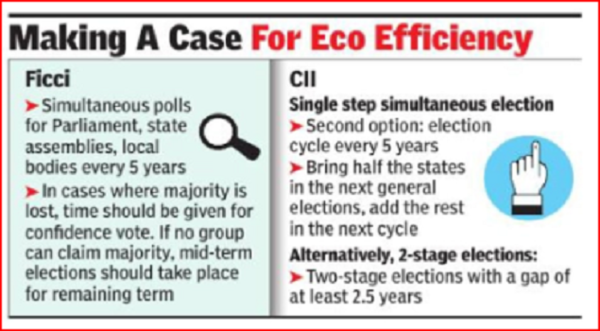NEW DELHI:
India Inc
has pitched for simultaneous
Lok Sabha
and assembly elections, once every five years, to avoid disruptions and additional costs.
Industry bodies Ficci and CII have made separate presentations to the committee headed by former President Ram Nath Kovind. While Ficci is firm in its demand for a single election every five years for Union, state and local governments, CII too has backed the idea, while proposing elections every two-and-a-half years as an alternative plan.
"Our ease of doing business is getting significantly constrained by multiple elections at various times at various levels.
With multiple codes of conduct for these elections, the inevitable slowdown in decision making by govt hurts business and industry badly. This also discourages necessary reforms to be carried out by various govts," Ficci general secretary Shailesh Pathak wrote in a letter to the committee, following a meeting last week.

It has said that govts should be voted with majority for five years, and in cases where majority is lost a specific period of, say, 10 days should be given to seek a vote of confidence for an alternate group. "If no group can claim majority, then mid-term elections should take place only for the remaining term," Ficci has suggested.
The lobby group cited a report by Niti Aayog to argue that in 2014, the model code of conduct resulted in suspension of governance and development activities for nearly seven months. Reducing frequent elections could help save anywhere between Rs 7,500 crore and Rs 12,000 crore, it estimated.
It has also proposed allowing voters to cast their vote at the nearest polling booth and use the 'India Stack', based on homegrown technology, to prepare electoral rolls instead of the current system which is time consuming.
Rival chamber CII, which met the panel earlier, has pointed to its demand for a common election in 2012 and 2018 itself, and argued that model code of conduct takes a toll on infrastructure projects in the initial stage of execution with each election hitting govt work as employees are pulled into the electoral process for nearly two months. "Private sector is reluctant to invest months before and after the elections. So is the case for public investment which affects economic activity, overall development and jobs & livelihoods," it said.
It further argued that apart from one productive day getting lost every time polls are held, there is economic loss as workers often take holidays to go to vote, which is often not the same as the place of work. "
Simultaneous elections
can reduce the overall expenditure incurred on general as well as state legislatures, making it more cost-effective and at the same time there are less days of productive work that are lost due to multiple elections," CII said.












 English (US) ·
English (US) ·